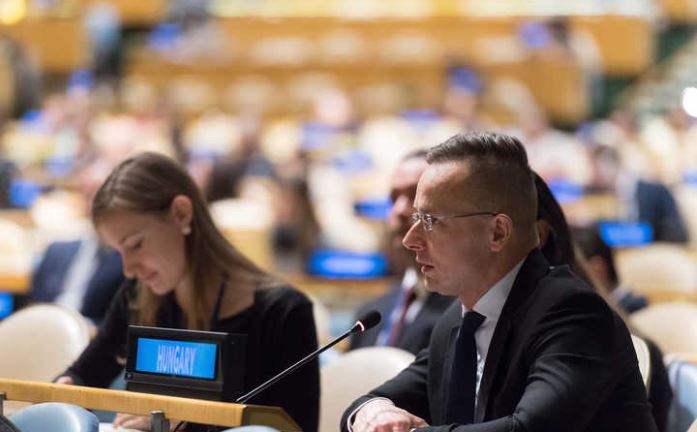Hungary, along with some like-minded countries, including Poland, who share a similar position on migration, will make every possible effort to prevent the UN’s global migration package from becoming a basis of reference in international law, Hungarian Foreign Minister Peter Szijjarto told a UN General Assembly session focusing on human rights in New York on Wednesday.
What we said last year, after Hungary, the United States, Poland, the Czech Republic, Israel and Brazil had rejected the UN global migration package, has come true. It was already obvious at the time that the UN, backed by the European Union, would try to implement piecemeal what it had failed to reach in one go, Hungary’s Foreign Minister said, the V4 news agency reported.
Since the rejection of the package by six countries last year, the UN has drafted a series of resolutions that refer to the global migration and refugee packages, and has made repeated attempts to incorporate them into international law as a basis of reference, Peter Szijjarto added.
“Hungary’s position is clear. The global migration package should neither fully, nor partly become part of international law,” the Hungarian Foreign Minister emphasized. He warned that the resolutions “being churned out” by the UN basically relativise border defence and portray it as a human rights issue. For Hungary, however, border protection is a matter of sovereignty and security, he said, adding that violating borders and supporting and finding excuses for border violators are unacceptable. However, the UN resolutions in the pipeline will promote migration and encourage people to choose the country where they wish to live and get there by violating the borders of dozens of countries, Szijjarto said.
This approach is unacceptable to us. It is clearly laid down in international law that those who are forced to escape from their homeland should flee to the first secure country and stay there until they can safely return home. The United Nations, however, promotes that those who escape from or leave their country for any reason should be able to go freely, even to the other corner of the world, he said.
An unfettered wave of refugees, Szijjarto said, would pose a serious security threat and risk to the global community, especially to the transit countries of migration. “Unfortunately, we in Central Europe have sad experiences and we can already see the warning signs as about one hundred thousand illegal immigrants have accumulated in the Western Balkans. It is clear that if these irregular migrants set off, then illegal migration could offer a chance for terrorist organisations to spread their extremist ideologies and militants worldwide,” warned the Hungarian foreign minister.





Comments are closed for this post.